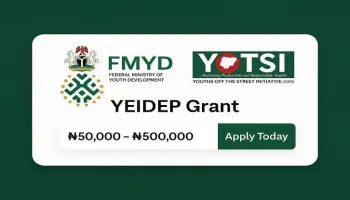The Federal Government will begin disbursing grants under the Youth Empowerment and Innovation Development Programme (YEIDEP) in July 2025, in what is seen as a major step toward empowering young Nigerians and strengthening the country’s small business ecosystem.
Launched as a key youth-focused initiative, YEIDEP has already attracted over 4.6 million applications from across Nigeria. The program promises non-repayable grants ranging from ₦50,000 to ₦500,000 to support youth-led ventures across priority sectors including agriculture, information and communication technology (ICT), fashion, retail, and vocational trades. The goal is to provide much-needed capital to startups and small businesses driven by young Nigerians, particularly those operating in underserved communities.
Coordinated by the Federal Ministry of Youth Development in collaboration with Youths Off The Street Initiative (YOTSI), the programme is designed not just as a financial intervention but also as a strategic move to drive grassroots entrepreneurship, stimulate innovation, and build a more inclusive economy. Officials have stated that applicants with practical, sustainable, and impact-driven ideas will be given priority during the selection process.
Beyond financial assistance, YEIDEP is expected to open up long-term economic opportunities for the youth by encouraging self-employment, skills development, and community-based solutions to unemployment. Government representatives emphasize that the initiative is part of a broader national strategy to reduce youth joblessness, address income inequality, and boost micro and small enterprise activity in both rural and urban settings.
The program also signals a shift in the government’s approach to youth development—moving from short-term empowerment projects to more structured, scalable economic support. With Nigeria’s youth population making up a significant share of the unemployed, YEIDEP is seen as an essential response to the growing demand for inclusive economic policies that directly benefit young people.
Further announcements on the verification process, disbursement timeline, and monitoring mechanisms are expected in the coming weeks. Stakeholders, including business mentors and civil society groups, are also expected to play a role in supporting the beneficiaries and ensuring the grants translate into sustainable business growth.
As young Nigerians prepare for the next phase, many are hopeful that the program will not only provide capital but also serve as a launchpad for innovation, job creation, and long-term economic transformation across the country.










